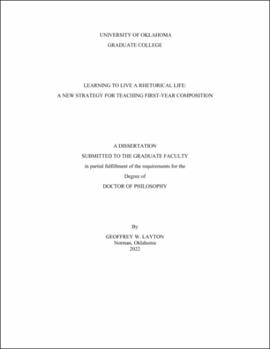| dc.description.abstract | Finding a Pedagogical Path to a Rhetorical Life: The received history of first-year composition (FYC) pedagogy seems to present itself in almost Darwinian evolutionary terms, first emerging from the swamp of Susan Miller’s current-traditional basement (121), then developing into a more advanced disciplinary state with the advent of the “writing process,” and finally, after many presumably beneficial “turns” (for example, the “social turn”), reaching what today might be seen as an almost teleological moment, the establishment of an independent academic discipline based on an accepted pedagogical model. The species has more than survived, it has also most certainly thrived. However, this evolutionary journey may not be as highly advanced, well-developed, and firmly established as it first might seem. Like the narrator of Frost’s “The Road Not Taken,” many composition scholars tell of their academic and pedagogical journey “with a sigh,” tacitly acknowledging that there have been “roads not taken,” resulting in a much different, even more advanced level of evolutionary development that I call the “rhetorical life,” a life that current FYC theory and pedagogy seem incapable of imagining, let alone creating in the classroom.
Nonetheless, I will try to create it here by proposing other pedagogical strategies that, I will argue, are ultimately more productive and, in the end, more effective than any of the other current instructional models including but not limited to the most recent argument model that has come to be called, among other terms, “civic engagement.” In fact, it will be an “academic model,” not the argument model, of composition that can best respond to a vast array of rhetorical situations that students and graduates will encounter, from the seemingly prosaic demands of business management to the intense challenges of political debate to the intellectual rigors of academic research. | en_US |
